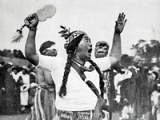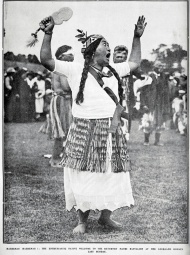Events In History
-
 6 April 1919NZ (Māori) Pioneer Battalion returns from war
6 April 1919NZ (Māori) Pioneer Battalion returns from warThe Pioneer Battalion was one of only two NZEF formations to return from the First World War as a complete unit. Its welcome home was more extensive than that given to other troops. Read more...
Articles
Māori and the First World War

Māori reactions to serving in the First World War largely reflected iwi experiences of British actions in the 19th century.
- Page 1 - Māori and the First World WarMāori reactions to serving in the First World War largely reflected iwi experiences of British actions in the 19th
Māori units of the NZEF

More than 2000 Maori served in the Māori Contingent and Pioneer Battalion during the First World War
-
Page 3 – Pioneer Battalion
In early 1916 the Maori Contingent ceased to exist and was replaced by the New Zealand Pioneer Battalion.
-
Page 4 – On the Western Front
The New Zealand Pioneer Battalion arrived in France in April 1916. It was the first unit of the New Zealand Division to move onto the bloody battlefield of the Somme.
-
Page 5 – Further information
Further information about Māori in the First World War.
Pacific Islanders in the NZEF

Cook Islanders, Niueans, Fijians and Gilbert Islanders all took their place in the ranks of the New Zealand Expeditionary Force during the First World War. As well as the dangers of war, Pacific soldiers faced language difficulties, an unfamiliar army diet and European diseases.
-
Page 3 – The Rarotongan Company
Information on the New Zealand Rarotongan Company, which served in the Sinai and Palestine campaigns 1916-18.
The Arras tunnels

During the First World War the men of the New Zealand Tunnelling Company, many of them hardbitten West Coast miners, helped create a vast network of military tunnels under the French town of Arras.
- Page 2 - The New Zealand Tunnelling Company With both the Allies and the Germans trying to tunnel under each other's lines to lay mines, the New Zealand Tunnelling Company's experience was
NZ Railways at war

The railway system and its workforce was one of the most valuable assets available to the New Zealand state to support the national effort during the First World War
- Page 4 - Railwaymen in the NZEFMore than 5000 permanent NZR employees served overseas during the war, about 40% of the 1914
Related keywords
- wairoa
- shipping
- WW1 home front
- maori in war
- gisborne
- whanganui city
- railways
- WW1
- german samoa occupation
- western front
- pona marunui
- WW1 stories
- henare kohere
- ngati porou
- letters
- battle of the somme
- peter buck
- whakarewarewa
- native contingent
- maori battalion
- tuhourangi
- gallipoli campaign
- ngati raukawa
- chunuk bair
- sari bair offensive
- otaki
- transport
- passchendaele offensive
- horses
- artillery
- cook islands
- niue
- pacific islanders
- maui pomare
- health
- disease
- rarotongan company
- narrow neck camp
- influenza pandemic
- palestine campaign
- sinai campaign
- fiji
- egypt
- battle of messines
- le quesnoy liberation
- tunnelling
- arras
- mining
- flags
- war objects
- tonga
- te kao
- moutoa gardens
- putiki
- moutoa
- armistice
- belgium
- anzac
- ngati kahungunu
- religion
- haka
- joseph ward
- apirana ngata
- alexander godley
- badges
- insignia
- conscription
- trenches
-
Main image: Henare Wepiha Te Wainohu memorial, Wairoa
The Reverend Henare Wepiha Te Wainohu served as chaplain to the Māori Contingent during the First World War.


























